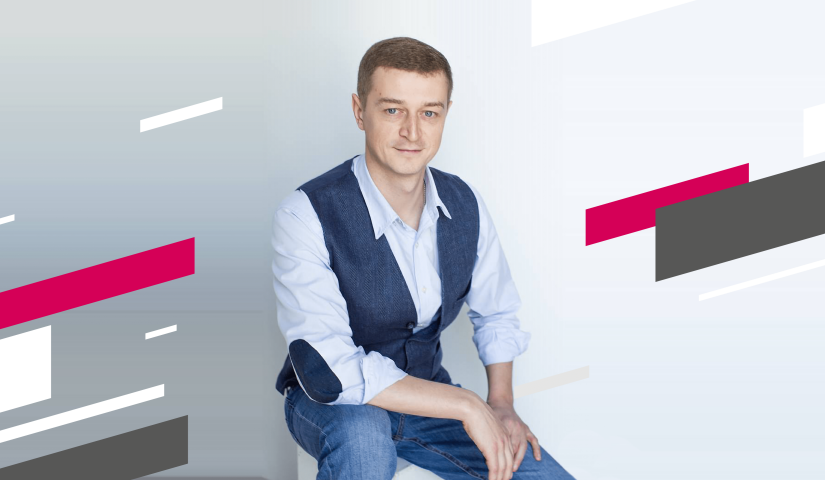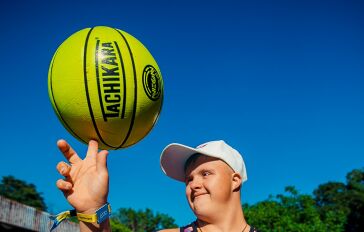
Denys Denysenko — a psychologist, master of health care management, and certified Gestalt therapist who helps organize humanitarian aid to the population in crisis. One of the lecturers of the course «Psychological Support in Crisis» developed by experts of the Israeli Trauma Coalition talks about the practices that help control your mental state and help others without harming yourself.
— To help others, you have to follow specific rules of your mental hygiene. According to the statistics, 3% – 7% of professionals who help others may have symptoms of PTSD. Therefore, it is essential to monitor the various signs of emotional exhaustion. Since 2014, we have experienced cases when volunteers, exhausted by their job, lost their sense of existence and fell into depression and apathy. Psychologists could suspend their practice for a year or two.
It should be clear that people of social professions who are now in Ukraine are also engaged in the same stressful environment, even if they are in a relatively safe place. We do not use the term safe place because any part of Ukraine cannot be considered safe. And this means an extra tension for every person, and the anxiety among social workers, volunteers, and psychologists is doubled because they are dealing with acute stress reactions of others.
You have to remember that you can help another person as much as you have your resources. So you need to renew your resources through six resource channels. These channels are well known but were systematized by Israeli scientist Shmuel Lahad.
1. Faith and values: prayers, rituals (religious), watching motivational movies (belief in your strength). Looking for meanings
2. Affect and emotions: sources of emotions – films, theater plays, communication with loved ones, expression of emotions
3. Social support: various social roles and functions. Belonging to a group, community
4. Imagination: different types of creativity, improvisation, humor, play
5. Cognition: quick organization, problem-solving, record keeping, planning, adherence, testing probabilities and alternatives
6. Physiology and body: physical activity, food, nature
Usually, a person has one or two most developed channels you can rely on during stressful events. The more channels a person develops, the more ad adaptive to stressful events he is and can take these events more easily.
Most resources can be found in media that have not been used before. Developing channels means simple actions first and then building a more complex pattern of behavior.
Mental hygiene. Self-love as a reaction to difficult circumstances
First, it is essential to remember that any response to stress in the current environment is expected. This is a normal reaction to abnormal events.
But some signs show that you need to take care of yourself. There are feelings of motivational and physical exhaustion, mental distancing from professional responsibilities or emotions of negativity or cynicism toward professional responsibilities, and reduced efficiency.
However, good hygiene should be followed even when there are no symptoms. One of the natural reactions to stress is to help others. This makes it easier for us to cope with our stress. And that’s why the volunteer movement is so active during the crisis. Therefore, even when you have enough strength and motivation, it is important to dose the load and constantly renews these resources. You need to count your time not in hours or results but in those effects that your psyche can process.
You need to think of yourself every day. When we were kids, we were taught altruism and very rarely self-love. However, remember the simple rule of conduct on an airplane in an emergency case you should put your mask on first before helping a child or loved one. The same goes for those who help others. I use a quote from the famous psychologist Eva Rambala: «What can I do today to stay empathetic?» You need to renew your resources every day.
How to overcome stress: Rules and methods
The first rule is to calm yourself down. Easy to say, but not easy to do. So we use specific techniques and algorithms shared by our colleagues from the Israeli Trauma Coalition.
To regain control of the body during an acute stress reaction, we follow the simple rules of the so-called method of 4 elements:
Box Breathing. The first reaction to stress is the desire to breathe, and there is a trap because when we inhale, we do not calm down. But on the contrary — we get excited. Therefore, box breathing should start with a slow exhalation for 4 seconds. Then hold your breath for 4 seconds and inhale just as slowly. Hold your breath again. And so repeat 3-4 cycles.
The following simple rule is to drink water. The larynx dehydrates during stress. It signals the body to focus, so you need to take a few sips of water or imagine a lemon to cause salivation.
Then you can relax specific muscles, which are mobilized during stress and sometimes cause overexertion. There is a so-called method of progressive relaxation when a state of deep relaxation of the whole body is achieved by conscious tension of certain muscle groups.
Having regained control over the body, you can move to mental health using the aforementioned six channels.
Note:
The International Charitable organization Parimatch Foundation and Israeli Trauma Coalition launch a training course for psychologists specializing in «Psychological Support in Crisis». One of the lecturers was Denis Denisenko.
The project aims to share with Ukrainian psychologists the latest techniques of crisis assistance that are needed when working with internally displaced persons of different ages during the war.






